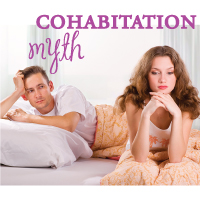Cohabitation Myth

Many dating couples opt to live together before deciding to marry, because they believe that it is a responsible and prudent thing to do.
They reason that cohabitating together will be like a trial marriage. They will learn all about each other’s habits and discover whether they are truly compatible. And when they do finally marry, that they’ll have a head start because they’ll be knowledgeable of each other, and they will have already negotiated many of their differences. They have the best of motivations, but unfortunately it’s not actually how it works.
Studies consistently show that marriages preceded by cohabitation are more likely to fail.
The incidence of divorce among these marriages is around 50% higher than non-cohabiting couples. One reason why living together undermines rather than strengthens marriage, is that cohabitation is not a true ‘trial’ marriage. Cohabitation is not the same as the ‘real thing’. It is not even a poor imitation. It is an entirely different relationship.
There are four key characteristics that define marriage; freely entered, total and unconditional sharing of self, faithful and exclusive until death, fruitful and life-giving. These are the basis of the very vows a couple makes at their wedding.
Cohabitation only meets one of these – that it is freely entered into (usually). Cohabitating couples can be very generous and loving, but it can never be a total and unconditional gift of self while it is understood as a temporary relationship. By mutual agreement the partners reserve the right to change their mind.
When the going gets tough…give up?
Nor can a cohabitating couple claim fidelity until death if their commitment to each other only extends to as ‘long as they both feel like it’. And finally, raising a family is not usually part of the cohabitation arrangement. This is fortunate for the possible children involved, as marital stability is important to a child’s development.
The public commitment to life-long union that a couple takes at their wedding is very different to the private agreement to the ‘try it out’ arrangement of the couple living together. Just as playing a computer simulation of ‘fighter pilot’ doesn’t prove a person can safely fly a plane, living together before marriage is not a good test of a couple’s suitability for marriage.







Thanks for the article. Re the ‘Studies consistently show’ bit… it would be great to see reference to some of these studies. Young people will see right through such a claim without evidence.
Also there is a typo in paragraph 5… It says: “Cohabitating couples can be very generous and loving, but it can never be a total and conditional gift of self.”… I think that should be ‘total and unconditional gift’.
Thanks for the great work you do 🙂
Thanks for the article. Re the ‘Studies consistently show’ bit… it would be great to see reference to some of these studies. Young people will see right through such a claim without evidence.
Also there is a typo in paragraph 5… It says: “Cohabitating couples can be very generous and loving, but it can never be a total and conditional gift of self.”… I think that should be ‘total and unconditional gift’.
Thanks for the great work you do 🙂
Thanks Rob – will fix the typo and point taken about referencing.